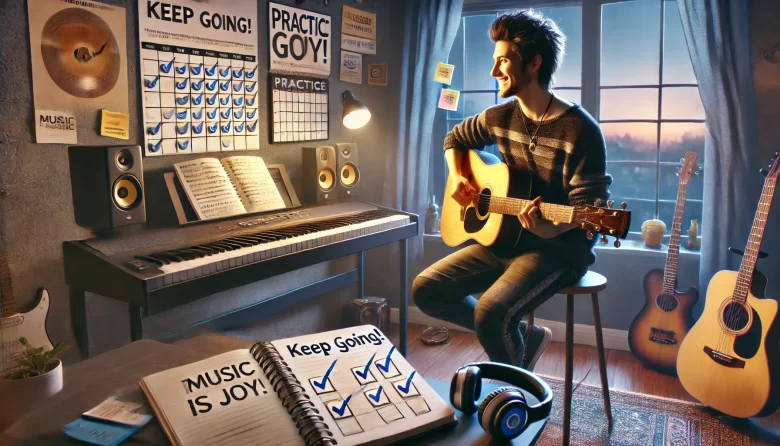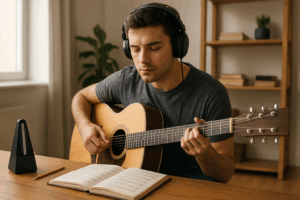Learning music is an incredible journey — filled with moments of joy, discovery, and personal growth. But let’s be honest: it also comes with challenges. From struggling through difficult pieces to days when progress feels invisible, even the most passionate beginners can find themselves questioning, “Why am I doing this?”
Staying motivated is the key to long-term success. In fact, motivation often matters more than raw talent. In this article, we’ll explore practical and emotional strategies to help you stay inspired and committed through every stage of your musical journey.
1. Set Realistic and Personal Goals
The fastest way to lose motivation? Setting goals that are too big, too vague, or not connected to what excites you.
Instead, aim for:
- Short-term wins: Learn one song, master a scale, or improve rhythm.
- Long-term vision: Imagine performing at a recital, playing for family, or writing your own song.
- Personal relevance: Choose goals based on your interests, not someone else’s path.
Tip: Break big goals into bite-sized steps. Want to play your favorite song? Start with the intro or chorus, not the full piece.
2. Celebrate Every Bit of Progress
Many beginners get discouraged because they’re focused only on what they can’t do yet. But music is about progress, not perfection.
Try This:
- Keep a practice journal where you record what you improved each day.
- Record short clips of your playing weekly — seeing how far you’ve come is extremely motivating.
- Share a small victory with a friend or music community.
Every clean chord, improved note, or smoother transition is worth celebrating. It’s proof that your hard work is paying off.
3. Play Music You Love
It might sound obvious, but far too many beginners stick only to exercises and method books, forgetting that music should be fun!
Add enjoyment to your routine:
- Learn simplified versions of your favorite songs.
- Experiment with styles you enjoy — jazz, pop, rock, folk, classical.
- Combine “serious practice” with “fun time” where you just play around.
Enjoyment fuels consistency. If you love what you’re playing, you’re more likely to come back to it tomorrow.
4. Track Your Practice — and Your Wins
Motivation is easier when you can see your progress. Yet, musical improvement is often gradual and hard to notice in the moment.
Tools That Help:
- Use a practice tracker app or spreadsheet.
- Create a calendar and mark every day you practiced — streaks can be highly motivating.
- Make a list of songs, techniques, or exercises you’ve learned and update it monthly.
Seeing your effort add up builds confidence and keeps you committed.
5. Surround Yourself With Music and Inspiration
The people and content you engage with matter. Surrounding yourself with music keeps the fire alive, even on hard days.
Ways to Stay Inspired:
- Watch performances or tutorials from your favorite musicians.
- Read interviews about their journeys — many started just like you.
- Listen to music mindfully and identify what you’d like to learn next.
You can also join online communities for beginners — forums, Discord groups, Reddit threads — where others share tips, frustrations, and triumphs. It reminds you that you’re not alone.
6. Accept That Motivation Fluctuates — and Show Up Anyway
One of the biggest lessons in learning music (and any long-term pursuit) is this: you won’t feel motivated every day — and that’s okay.
There will be days when:
- You feel tired or bored.
- Progress is slow or invisible.
- You question whether it’s “worth it.”
The trick is to show up anyway — even if it’s just for 5 minutes. Consistency builds momentum, and momentum reignites motivation.
Try the “Just 5 Minutes” Rule:
Tell yourself, “I’ll just practice for 5 minutes.” Most of the time, once you start, you’ll keep going.
7. Change Things Up When You’re Feeling Stuck
Sometimes, a dip in motivation comes from doing the same thing too often.
Refresh your practice by:
- Learning a song in a new genre.
- Switching instruments temporarily (if you have access).
- Trying improvisation or composing.
- Watching new tutorials or using a new app.
Variety keeps the brain engaged and the process exciting.
8. Remind Yourself Why You Started
When motivation dips, return to your “why.”
Ask yourself:
- Why did I start learning music in the first place?
- How did I feel the first time I played a note or learned a song?
- What do I hope to express or achieve through music?
Write your “why” on a sticky note and keep it visible in your practice space. Reconnecting with your purpose helps you push through plateaus.
Keep Going — Even When It’s Tough
The truth is, every musician — from total beginner to concert professional — goes through ups and downs. But those who stick with it? They’re the ones who learn how to stay motivated, especially when it’s hard.
So give yourself credit for starting. Give yourself grace when it’s slow. And give yourself permission to enjoy the ride — because music is not just about results, it’s about the experience.
You’re learning a language of emotion, creativity, and expression. And every day you show up, you get a little more fluent.
Stay motivated, stay consistent, and most of all — have fun.




